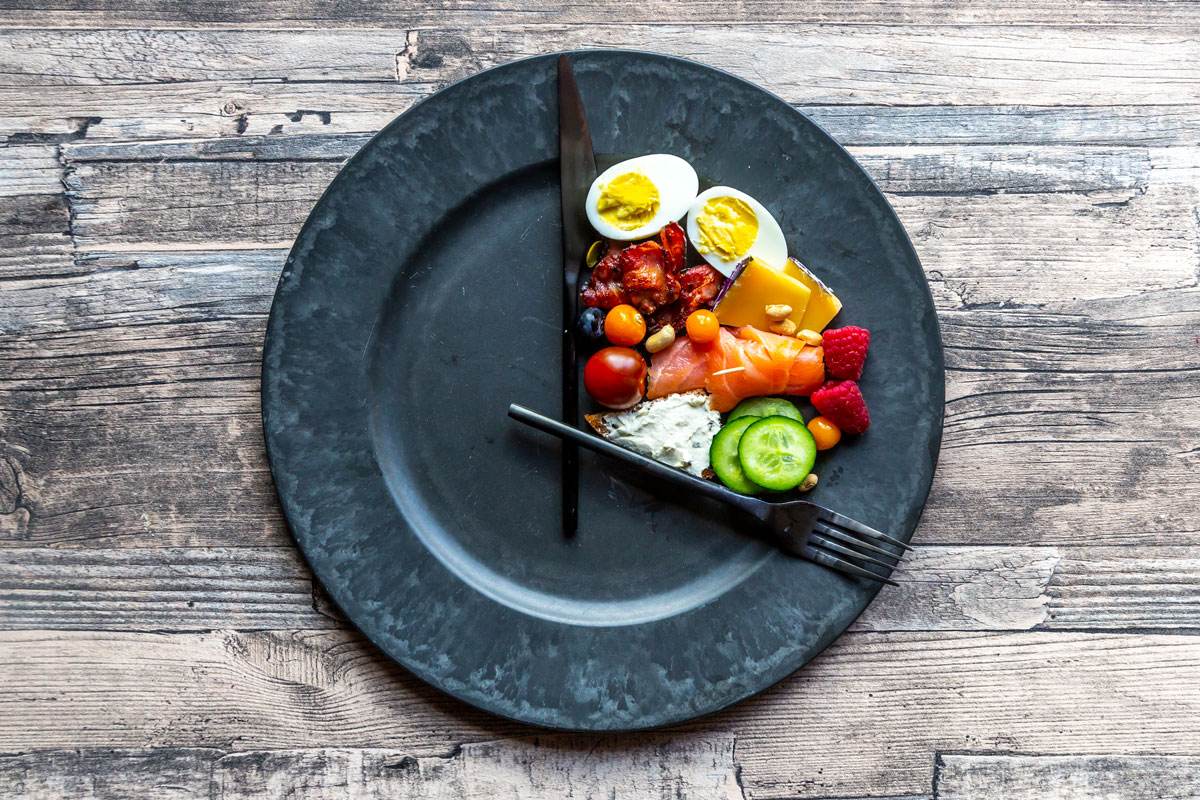
Photograph by lacaosa via Getty Images
I cradled a piece of my dog’s Pupperoni treat like a fragile robin’s egg, then brought it up to my face and inhaled deeply. Would it be bad if I ate this?
That’s the sort of thought that came to mind with alarming frequency. I also forgot the word for “table.” The squeak of a Styrofoam egg carton made me positively apoplectic. I considered licking the leavings from a Taco Bell wrapper. And then I saw my kids picking at the “crusts” from their lunchtime quesadillas.
“Eat a couple more bites and then give it to Mommy,” my husband said, reciting a common refrain in our house. Then he fumbled to put the words back in his mouth. “No wait, don’t give it to Mommy.”
He wasn’t trying to deprive me of that leftover cheesy goodness. I wasn’t forgoing food as a religious exercise, or as a last-ditch effort to drop a bunch of pounds in wholly unhealthy way. I was trying something called intermittent fasting.
There are several ways to intermittently fast. You might eat during a particular eight-hour time frame, or eat one meal a day for a certain number of days a week, or eat little to nothing for one day a week. A popular plan is “16/8,” in which you fast for 16 hours (many of those while you’re asleep) and eat during an eight-hour window. The “5:2” approach involves eating as usual for five days of the week, then eating just one meal of up to 600 calories on each of the remaining two days.
Choosing to forgo some or all food is a strategy that screams privilege, and feels a little tone-deaf in a country where one in six people can’t find enough to eat. So it’s not surprising that celebrities like Jennifer Aniston, Kourtney Kardashian, and Chris Pratt sing the diet’s praises. The science, however, is mixed.
Advocates say that going without food for a number of hours allows the body to use up the calories you’ve eaten, exhaust your sugar stores, and switch from glucose-based energy to ketone-based energy, which enables you to start burning fat. Some studies have shown that this strategy can improve everything from thinking and memory to heart health, physical performance, diabetes, and tissue health.
And then there are the weight-loss claims. A Harvard Medical School review of 40 studies found that intermittent fasting yields a typical loss of seven to 11 pounds over 10 weeks. But another study said the results are no better than those seen as a result of traditional calorie counting. And yet another study said that what’s lost in intermittent fasting isn’t primarily fat—it’s lean mass.
“While there is science to back up some of the claims, we still have a lot to learn,” says registered dietitian nutritionist Kelsey Smith, who works for STAT Wellness in Atlanta. “A recent 12-week study conducted in humans demonstrated that time-restricted eating was not an effective weight-loss tool and even resulted in more muscle loss than those who didn’t eat in a restricted window. For some people, it might be effective; for others, it might do more harm than good.”
She cautions that intermittent fasting isn’t safe or advisable for everyone, particularly those with diabetes, thyroid conditions, high blood pressure, or heart disease. Fasting can also be a dangerous practice for people who have or are prone to eating disorders.
“It can be a slippery slope,” Smith says. “It might be another way to control intake.”
Prior to the pandemic, I ate healthy food about 80 percent of the time and kept to a strict, six-day-a-week regimen of high-intensity fitness classes that helped me feel strong, less stressed, and fairly at ease in my own skin. I eschewed “diets,” didn’t count calories, and didn’t step on a scale for fear of becoming too obsessed with the numbers. When the pandemic hit and the gyms closed, I felt entirely unmoored. To me, the at-home workouts and outdoor runs were boring and discouraging. I snacked when I got sad. I felt heavier and unhealthy. And I could not stand it.
So I thought I’d give intermittent fasting a try, and embarked on it as part of a 30-day nutrition program with Isagenix, the multilevel-marketing company that has turned at least a dozen of my high school classmates into nutrition-products salespeople. Six days a week I had protein shakes for two meals, with small snacks in between, and a third meal that totaled no more than 600 calories. On the seventh day, I was supposed to “fast,” drinking lukewarm water with a vitamin-packed powder, along with regular water and small snacks.
On my fasting day of the first week, I was tired, cranky, and felt the hours moving in slow motion. I made it to mid-afternoon before my kids’ constant narration of their Fortnite games had me threatening to throw the PlayStation—and them—out the window. So I took my snacks early. And then I kept snacking.
In the second week, my fasting day was a little bit more successful. I didn’t feel as panicky about not having my day broken up by meals. I was, however, in a car for six hours as we drove to the beach, so there weren’t a ton of temptations. Fasting day number three took place during the drive home, and that time I nursed two protein shakes throughout the day, along with the fluids, which kept me more consistently sated—until 6 p.m., when I broke down and ate some Indian food.
So, yeah, strict intermittent fasting may not be my jam (I’m not alone; one study showed that 38 percent of people assigned to a fasting regimen dropped out). But it did teach me a few things. I can be mindful about the calories I put into my body while not obsessing about them and how I’ll burn them off. I can take charge of my health even when the gyms are closed or seem unsafe. I can try on the idea of moderation and view food as both fuel and fun. I can make it through several hours without having a snack. And I can survive a 30-day program of lower-calorie eating and sort-of fasting, and my pants and my body will indeed feel better. Maybe my health will be better for it, too?













